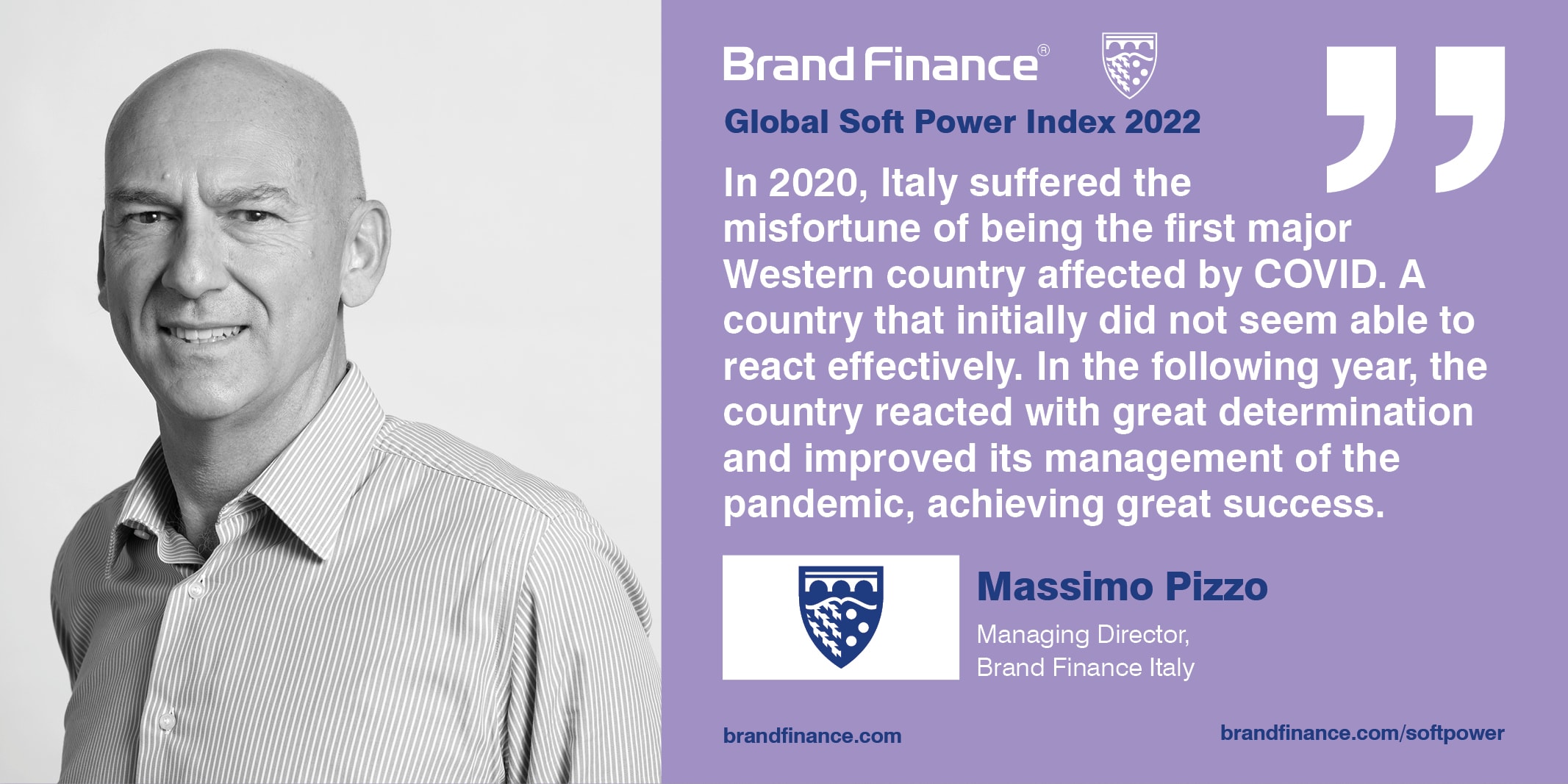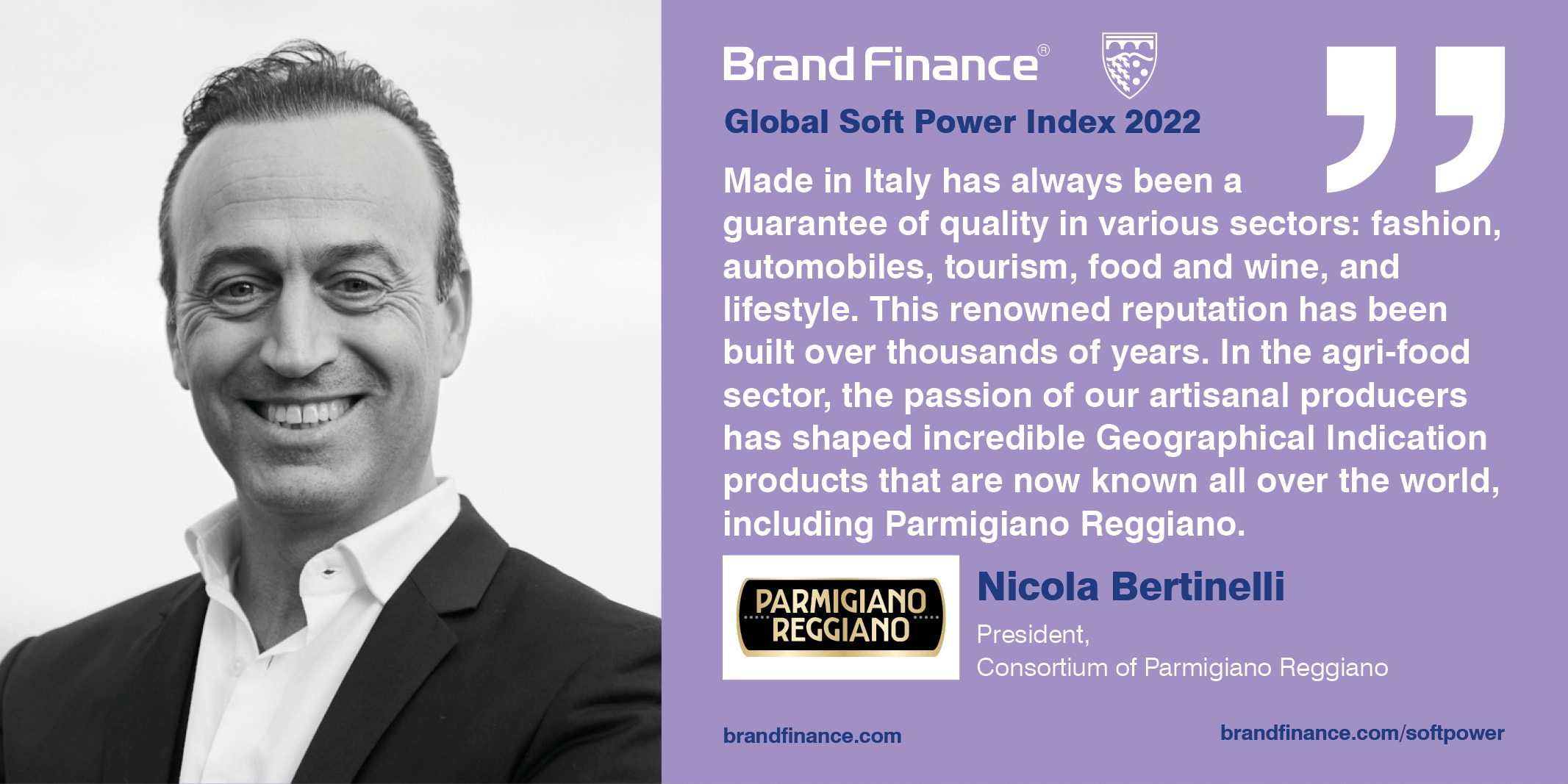This article was originally published in the Global Soft Power Index 2022.

Italy enters the top 10 of nations with both the greatest soft power in the world and among those that have improved the most year on year, according to the Global Soft Power Index 2022.
After the decline from 11th to 19th place last year, this year Italy gains nine positions to claim 10th place. Italy's current soft power is consistent with its economic power, in fact Italy is the 8th nation by GDP in the world.
Last year’s drop in rank was largely due to the dramatic images from Italy which spread around the world in 2020, following the outbreak of the pandemic. At the time, Italy suffered the misfortune of being the first major Western country affected by COVID. A country that initially did not seem able to react effectively.
In the following year, the country reacted with great determination and improved its management of the pandemic, achieving great success. 2021 was a special year for Italy, as The Economist magazine decreed Italy the country of the year. In fact, Prime Minister Mario Draghi and his government contributed to the strong recovery of the economy. The victory in the European football championships, the final at Wimbledon, the good performances at the Olympics, and the success of Maneskin at Eurovision have further contributed to Italy's soft power around the world.

This strong recovery is reflected in the improvement by 6.4 points in the Global Soft Power Index 2022. Only the USA, China, and the UK have performed better than Italy. On the other hand, this year's record recovery follows last year's collapse. These strong variations indicate that the Italian nation brand is not as solid as it should be. It is subject to events rather than the identity of the country. In fact, in the Brand Finance Nation Brands report published every year in the autumn, Italy regularly ranks lower on brand strength than both its traditional competitors and much smaller nations such as Belgium, Ireland, or Austria.
The current push given by Prime Minister Mario Draghi, and the great desire of Italians to contribute to the country’s development, will certainly strengthen the nation brand more and more.
Interview with Nicola Bertinelli.

How do you leverage Italy's soft power as a leading country for food to enhance your own story telling?
Made in Italy has always been a guarantee of quality in various sectors: fashion, automobiles, tourism, food and wine, and lifestyle. This renowned reputation has been built over thousands of years. In the agri-food sector, the passion of our artisanal producers has shaped incredible Geographical Indication products that are now known all over the world. One of these is Parmigiano Reggiano, which was invented by monks in medieval times and then developed by generations to the present day. Little has changed since then, as still today the cheese is produced with only three ingredients (milk, salt, and rennet), without additives and preservatives, and with a production technique that is almost identical to that from centuries ago. Parmigiano Reggiano is therefore one of those products that have contributed to shaping the fame of "Made in Italy". We can consider it a very long-term investment, which was started nearly 1,000 ago, and which today brings value to our country and to Parmigiano Reggiano.
How does Parmigiano Reggiano enhance Italy's reputation within their trade relations and global marketing strategies?
The promotion of Parmigiano Reggiano has always been focused on communicating the values of the product and the underlying brand: environment, territory, animal and human well-being, and nutritional qualities of our cheese. To this end, communications and press agencies have been activated in 16 foreign countries, and we collaborate directly or through the main exporters with the major world distribution chains.
This allows us to have contact with many people, governmental and non-governmental organisations, entrepreneurs, trade associations, and other Consortia. A really long list! These meetings obviously have a positive effect on the reputation of our country because it is impossible not to fall in love with Parmigiano Reggiano. And I am not referring only to the taste and its nutritional qualities, but also to its millenary history and the Area of Origin which attracts hundreds of thousands of tourists every year. This tourist flow generates value not only for the dairies but for the whole region.
In 2021, the Parmigiano Reggiano supply chain generated a value of €1.7 billion for our dairies and our breeders, a community of about 50,000 people spread over the provinces of Parma, Reggio Emilia, Modena, and a part of Bologna and Mantua.

Italy has a rich heritage and culture, which is well-known across the world. This is helped by several protected and authentic products made in Italy. What role does having a PDO status play in Parmigiano Reggiano’s reputation among key stakeholders?
The system of European PDOs was fundamental to provide common rules recognised all over the world. For producers, making a Geographical Indication product means respecting strict quality and traceability parameters, but also having the right recognition for their work, as well as legal protection that extends to the entire European Union and to other states in the world. For consumers and stakeholders, the symbol of the PDO (Protected Designation of Origin) is a distinctive element that immediately provides numerous and essential pieces of information about the product: firstly, where it comes from – the Area of Origin, secondly, its link with the region, thirdly, that it is produced with artisanal techniques, and finally that it has a proven history.
So, to bear the designation “Parmigiano Reggiano PDO”, the cheese must be made adhering to strict rules. It must be produced in the Area of Origin, which includes the provinces of Parma, Reggio Emilia, Modena, Mantua to the right of the Po River, and Bologna to the left of the Reno River — a surface of approximately 10,000 km2.
Parmigiano Reggiano is so strongly bound to its Area of Origin that no other place in the world can produce the same product — even if the same production techniques were used.
Going back to the point of counterfeiting, using the term ‘parmesan’ to broadly describe non-Italian hard and grated cheeses is not compliant with the production specifications of Parmigiano Reggiano, and is in direct violation of the EU’s Protected Designation of Origin. In 2008, the European Court of Justice made a decisive ruling that only cheeses bearing the PDO “Parmigiano Reggiano” can be sold under the denomination “parmesan”. This was also a victory for consumers who receive a strong guarantee or traceability and will be free from misleading denominations on the market.
Unfortunately, the laws that classify and protect Parmigiano Reggiano within the European Union are diluted overseas, opening the door for misusages of the term and imitation cheeses within the United States and other countries.

